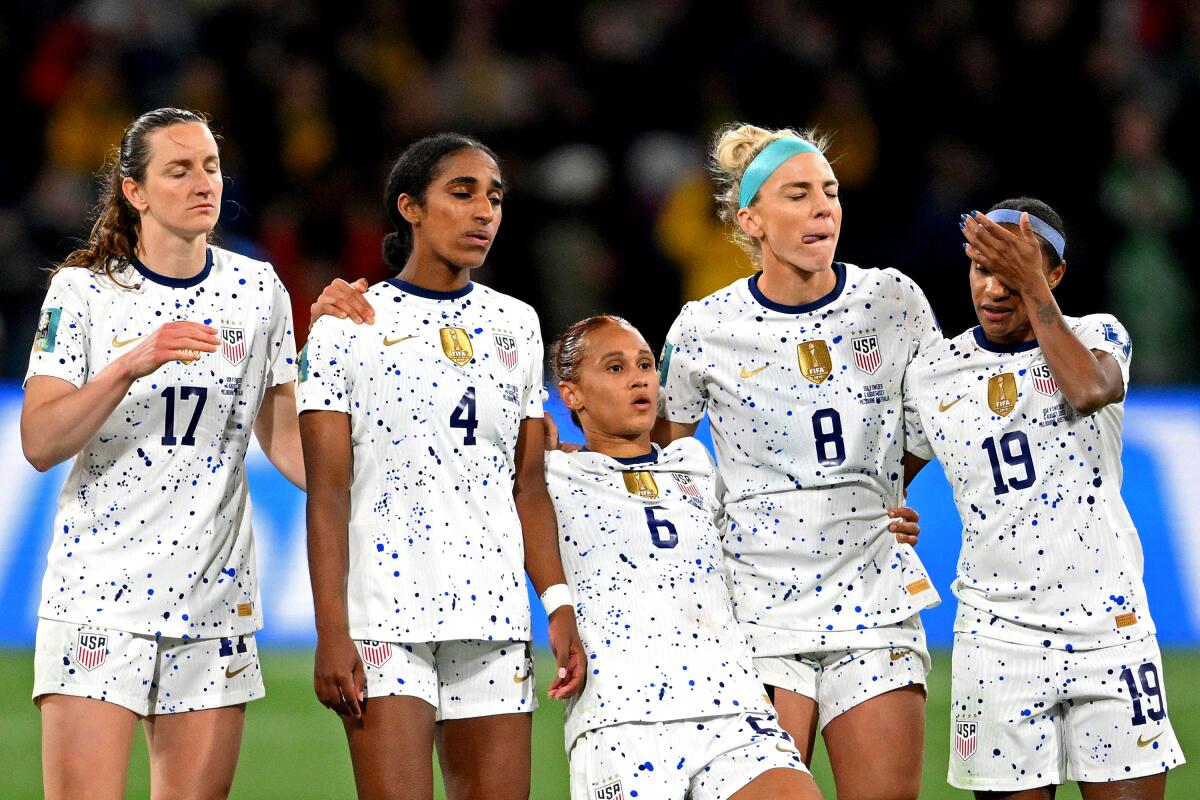Column: U.S. women’s World Cup loss proves ‘Barbie’s’ point: Women are not allowed to fail

- Share via
When my friends and I took our daughters to the Friday night opening of Greta Gerwig’s “Barbie,” the U.S. women’s national soccer team was playing its opening match against Vietnam in the World Cup. The U.S. team was winning handily. Even so, one of us moms had to be dragged away and, once in the theater, we all continued to watch the game on our phones until the moment the film began.
From the World Cup to “Barbie”: It felt like a triumph of feminism. With the added benefit of popcorn and Twizzlers.
Especially when, in the second half of the movie, America Ferrera’s working mom Gloria delivered her now-iconic monologue about how impossible it is to be a woman, how women can “never show off, never be selfish, never fall down, never fail.” Did we cheer Gloria speaking those words? You bet.
We just didn’t expect to be reminded of their truth, in a big public forum, almost immediately.
Three weeks later, as “Barbie” and her message continued to dominate the box office, the U.S. women’s soccer team lost to Sweden in penalty kicks and was eliminated from the World Cup it had won a record-breaking four times. In the Round of 16.
Ferrera, who co-stars in ‘Barbie’ as Gloria, a lifelong admirer of the doll, delivers a rousing speech about womanhood in the film. Here’s how it came together.
It was an enormous disappointment to the team’s many fans. But beyond disappointment quickly hummed something else: Shock, disbelief, outrage, anger and, from certain conservative quarters, schadenfreude.
Donald Trump used his platform as the most-indicted president in American history to launch homophobia, racism and misogyny into the conversation, tweeting that the team deserved to lose because it was too “woke” and “WOKE = FAILURE.”
Predictably, this was echoed by the usual suspects (Megyn Kelly) who see the commitment to racial justice, LGBTQ+ rights and pay equity voiced by many of the U.S. players (most notably Megan Rapinoe) as a threat to their way of life.
From such sources, this kind of “kick ’em when they’re down” tactic is infuriating but not surprising.
At least not as surprising as the level of “How could this happen?” disbelief expressed by many sports and cultural commentators, including former U.S. men’s soccer players Alexi Lalas and Taylor Twellman — disbelief that often came with a sexist subtext just as unsettling as the right-wing’s schoolyard raspberries.
I guess Lalas, who called the U.S. women’s team “unlikeable to a portion of America” for its “politics, causes, stances, & behavior,” hasn’t managed to squeeze in a screening of “Barbie” yet.
How could this happen? Let us count the ways. Going into the World Cup, we all knew that the U.S. had injuries that would keep some key players off the field (Becky Sauerbrunn, Catarina Macario, Mallory Swanson) and some (Rapinoe, Rose Lavelle) from playing at full strength.
More important, we all knew this team was in a big transitional phase, with a mix of final- and first- time players that would challenge any coach, especially one who, like Vlatko Andonovski, was making his World Cup debut.
Add to that the increasingly intense world of women’s soccer — in large part a byproduct of the U.S. team’s success — and the prospect of this team breezing through early rounds to find a challenge or two in the final, as they had in previous years, was simply magical thinking.
But apparently many people think Team USA is magic. Which seems like a compliment but really isn’t. The women on Team USA are athletes, not wizards or magicians, bound by the same rules of physics, age, experience, human fallibility and questionable coaching as their male peers.
And that’s OK. As Gloria, and “Barbie,” went out of their way to explain, women don’t have to be magical or superhuman or perfect to be successful. They are allowed to falter, screw up and fail, even when everyone is watching, without the world expressing utter shock or taking from that failure some larger message about what women are able to do.
Men are allowed to fail because they have a longer history of failing. Sure, male teams and superstar individuals also endure shock and outrage when they lose, but they have a host of historical peers to prove that losing, even a big game, is just part of the larger narrative.
In far too many fields, including professional sports, women do not have that history to lean on; they are writing their narrative as they go.
In many ways, sports is more forgiving than other parts of the culture; gymnast Simone Biles received her share of hate when she decided she was not in the right frame of mind to continue in certain events at the Tokyo Olympics, but everyone cheered when she recently dominated the Core Classic.
Despite what certain commentators might think, no one is going to stop watching women’s soccer because Team USA did not win a record-breaking fifth World Cup this year. But given the history of female directors in Hollywood, Greta Gerwig had better hope her next movie either makes $2 billion or wins seven Oscars; otherwise, her career will be seen as devolving, to the detriment of rising female directors.
As the human heart in a comedy filled with neurotic dolls, the ‘Ugly Betty’ award-winner is ready to take a bolder step toward the big screen with ‘Barbie.’
Team USA’s loss to Sweden was heartbreaking, especially since, after a lackluster game against Portugal that ended in a tie, Team USA seemed back on track, dominating possession and taking shot after very good shot, each time thwarted by Sweden goalkeeper Zećira Mušović, who was having a truly spectacular game.
The game went to penalty kicks, and a penalty shot by Sweden that seemed to have been stopped by U.S. goalkeeper Alyssa Naeher was ruled, via sensor, to have crossed the line. Sweden moved on to the next round and the U.S. did not.
Nothing could be further from the “humiliation” or “shocking exit” trumpeted by some headlines. It was very sad for those of us who wanted to watch Team USA play more games in the World Cup, and for the networks that profited from those games, but the time-space continuum was not destroyed, nor did the world of women’s soccer crumble.
Did people think that Team USA would just win all the World Cups henceforth and through eternity? That, despite injuries, retirements, young players and new coaches, it would never have a less-than-spectacular year?
For a culture that wallows in sports metaphors, we seem to have forgotten a basic truth: if you’re going to play, you’re going to lose sometimes. It’s what you do next that matters. No magic involved.
More to Read
The biggest entertainment stories
Get our big stories about Hollywood, film, television, music, arts, culture and more right in your inbox as soon as they publish.
You may occasionally receive promotional content from the Los Angeles Times.













